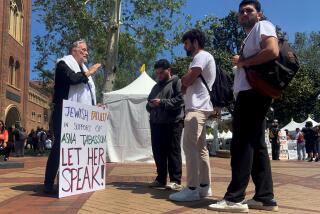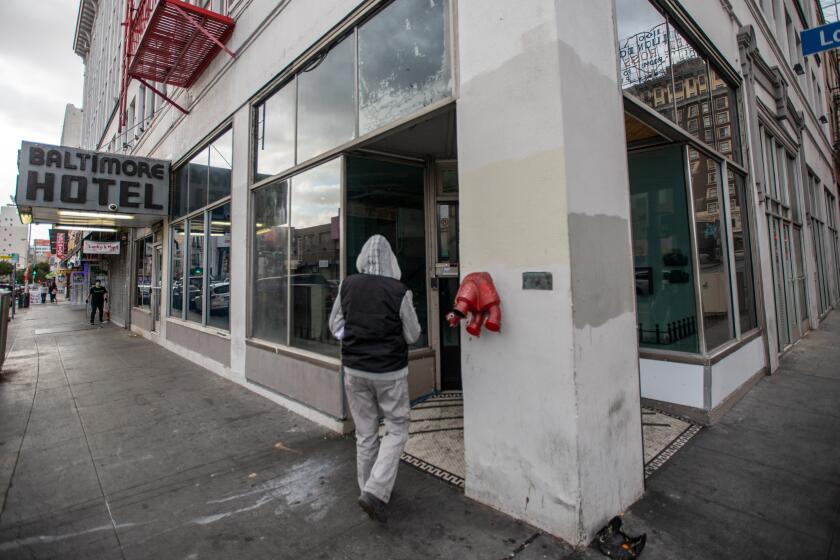Gov. Quiet on Williams’ Fate
The fate of Stanley Tookie Williams rested in the hands of Gov. Arnold Schwarzenegger on Thursday after lawyers for the condemned man made a final plea for his life and prosecutors said his crimes merit society’s harshest punishment.
After hearing attorneys’ arguments during a private, 75-minute meeting, Schwarzenegger made no comment and aides could not say how soon he would decide whether to grant Williams clemency.
“He will deliberate as long as it takes to make a conscientious, fair and just decision,” press secretary Margita Thompson said. She said Schwarzenegger would release a written statement as early as today or as late as Monday.
Unless the governor acts or a court intervenes, the four-time convicted murderer and co-founder of the Crips street gang will die by lethal injection at 12:01 a.m. Tuesday, becoming the 12th man executed in California since 1978.
None of the lawyers would disclose details of their presentations during the morning session, which took place in the governor’s Ronald Reagan Cabinet Room, nor would they characterize Schwarzenegger’s reaction.
The governor, seated at the long wooden table that dominates the nondescript conference room, was accompanied by legal affairs secretary Andrea Hoch, advisor Peter Siggins and two other members of his legal team. He did not ask questions, but received a letter from Williams, the contents of which were not disclosed, and viewed some material on a large screen.
Williams’ attorneys had hoped to present a videotaped plea from the death row inmate, but San Quentin Warden Steven Ornoski denied the request. Tape-recording of prisoners has been restricted since a gun smuggled inside a recording device figured in a bloody uprising at the prison in 1971 that left inmate George Jackson and five others, including three guards, dead.
Asked to assess the chances of clemency, Peter Fleming Jr., the lead lawyer arguing for Williams at the meeting, told reporters, “I’m not an oddsmaker.”
Fleming, who earlier in the week called the governor “a man of courage and independence,” said he is “frightened to death” that his client will be executed rather than be permitted to live out his life behind bars.
Los Angeles County prosecutors, meanwhile, said Schwarzenegger was gracious during the hearing. In remarks to the media, Deputy Dist. Atty. John Monaghan said Williams deserved to die for the senseless and brutal shotgun murders of four people during two robberies in Los Angeles in 1979.
Monaghan also said that the considerable public support for Williams should “absolutely not” sway Schwarzenegger.
“The evidence in this case is truly overwhelming,” Monaghan said, and Williams “should pay the ultimate penalty for his crimes.”
Williams was convicted of killing Albert Owens during the robbery of a 7-Eleven on Whittier Boulevard, and motel owners Yen-I Yang and Tsai-Shai Chen Yang and their daughter, Yu-Chin Yang Lin, who were murdered at the Brookhaven Motel on South Vermont Avenue 12 days later. He has said he is not guilty of the murders, for which he has been imprisoned 24 years.
On Thursday, Fleming said that when he met Williams, he told the inmate, “If you did this, you should confess to it because it will help.”
According to Fleming, Williams responded: “If my innocence will cost me my life, so be it.”
Williams has confessed to many robberies and assaults, specifically in his memoir, “Blue Rage, Black Redemption.”
Williams said he recruited members to the Crips, and that the gang terrorized South-Central in the 1970s. In interviews, he has said that his biggest regret in life was his role in starting the Crips.
“Like locusts we swarmed and stripped people of their valuables -- and then melted quickly away,” he wrote.
In pleading for clemency, Williams argues that he has transformed himself from a violent thug into a force for social good, one who can dissuade young people from pursuing the destructive life he once led.
He has written children’s books and taken other steps to warn youths about the perils of the gangster life.
“You don’t fake that for 13 years,” Fleming said of Williams’ efforts, which began after years in solitary following an initial period of bad behavior behind bars. “A football player responds best to a coach who has played football.... Stanley Williams has been where these at-risk children are.”
Prosecutors say that because he has refused to take responsibility for the murders, Williams should not be judged a redeemed man deserving of mercy.
Law enforcement officials, including Los Angeles County Dist. Atty. Steve Cooley, Los Angeles Police Chief William J. Bratton and Los Angeles County Sheriff Lee Baca, have strongly opposed clemency. They call Williams a coldblooded killer and a founding father of one of the nation’s most vicious gangs.
While the lawyers made their arguments inside the Capitol, about 100 supporters at a rally outside urged the governor to show mercy.
The crowd gathered beneath the towering Capitol Christmas tree included Bianca Jagger, the former wife of Rolling Stone Mick Jagger and one of the many celebrities who have rallied to save Williams’ life.
Chanting “Love life! Save Stan’s life!” the protesters waved signs and urged an end to capital punishment. An enormous throng of reporters, including some from outlets as far away as Italy and Japan, were on hand to record the event, illustrating the widespread interest in the case.
One large banner reflected hopes that the governor’s Austrian roots might make him inclined to spare Williams and read: “Arnold Would You Execute an Austrian?” There is no capital punishment in Austria, and the governor has been harshly criticized there for allowing an earlier execution.
Elsewhere on Thursday, surviving relatives of one of Williams’ victims spoke out on the case. Lora Owens, Albert Owens’ stepmother, said that the campaign to save Williams is “all about manipulation” and “Hollywood hype” and expressed confidence that Schwarzenegger would not grant clemency.
Owens’ ex-wife, Linda Owens, released a more ambiguous statement, saying she was inviting Williams “to join me in sending a message to all communities that we should all unite in peace.”
“This position of peace would honor my husband’s memory and Mr. Williams’ work,” concluded the statement, which did not call outright for clemency and was released by Williams’ lawyers.
State and federal courts have repeatedly rejected Williams’ legal claims, but the maneuvering may not be over yet. His attorneys are expected to file a motion with the U.S. 9th Circuit Court of Appeals, perhaps today, seeking permission to file a new habeas corpus petition in U.S. District Court in Los Angeles.
At San Quentin on Thursday, officials began altering Williams’ conditions in preparation for the possible execution, exchanging his clothes for sweats and shackling him and bolting him to a chair during his visits. Guards also removed most personal possessions from his cell, and will allow him only one item at a time -- whether it’s a toothbrush, a book or anything else -- until the execution, corrections officials said.
“You plan on killing somebody, and then you go out of your way to make their last days the most miserable, the most humiliating ever,” said Barbara Becnel, a close friend who visited Williams. “They stripped everything from his cell.”
San Quentin spokesman Vernell Crittendon said the changes were standard prison protocol, designed to prevent Williams from concealing items that might pose a danger to himself or others as his scheduled death draws near.
“Once we enter a five-day window [before the execution], we take steps to limit his ability to be assaultive,” Crittendon said.
If Schwarzenegger grants clemency, he would be the first California governor to give a condemned man a reprieve since 1967. That year, Reagan -- whom Schwarzenegger calls his political hero -- spared the life of Calvin Thomas, citing evidence that showed the man suffered from brain damage.
Schwarzenegger has said he dreads the decision in the Williams case.
In two previous instances, the governor found no compelling reason to grant clemency to convicted murderers.
One of them, triple murderer Donald Beardslee, was executed in January.
The other, Kevin Cooper, who killed four people in Chino Hills, was at least temporarily spared when an appellate court ordered a lower court to consider new DNA tests.
Schwarzenegger’s press secretary said his deliberations on Williams began well before Thursday’s hearing.
“It’s not something you turn on and off,” she said, noting that the governor had received written material from lawyers in the case weeks ago.
*
Times staff writers Maura Dolan, James Rainey and Henry Weinstein contributed to this report.
*
(BEGIN TEXT OF INFOBOX)
The lawyers fighting to save Stanley Tookie Williams’ life:
Peter Fleming Jr., 76, is a partner at Curtis, Mallet-Prevost, Colt & Mosle, a New York firm that began working pro bono on the clemency petition after being approached by the American Bar Assn. A graduate of Yale Law School and a former federal prosecutor, Fleming specializes in white-collar criminal defense work. He successfully represented boxing promoter Don King on fraud charges. He also served as a temporary special independent counsel for Senate leaders investigating leaks of confidential information in the 1991 confirmation hearings of Supreme Court Justice Clarence Thomas.
Jonathan Harris, 43, a partner at Curtis, is a Stanford Law School graduate. He specializes in complex litigation.
Lothlorien S. Redmond, 31, is an associate at Curtis. She is a graduate of Boalt Hall School of Law at UC Berkeley, where she worked at the death penalty clinic. She specializes in litigation.
Julie V. Withers, 30, an associate at Curtis, graduated from Fordham University Law School. She specializes in litigation.
Jan L. Handzlik, 60, is a partner in the Los Angeles office of Howrey Simon, Arnold & White, which was asked by Curtis to be California clemency counsel in the case. A UCLA Law School graduate and former federal prosecutor, Handzlik specializes in white-collar criminal defense.
Sandra Smith Thayer, 33, an associate at Howrey Simon, graduated from Tulane Law School and specializes in complex litigation.
Verna J. Wefald, 44, is a former state and federal public defender who specializes in death penalty appeals and other complex criminal cases. She is the only member of the defense team who has extensive experience in capital cases. In the Williams case, she has advised on the clemency petition while concentrating on final court appeals. Wefald, a graduate of Georgetown University Law Center, has her own law firm in Pasadena.
*
The lawyers arguing that Williams should be executed:
Patrick Richard Dixon, 56, has headed the Los Angeles County district attorney office’s major crimes division since April 2003 and has prosecuted dozens of criminal cases. A graduate of the University of San Diego School of Law, he joined the district attorney’s office in 1976.
John Monaghan, 53, assistant head deputy district attorney, was a deputy district attorney in San Bernardino County before joining the Los Angeles County district attorney’s office. He made headlines in 2003 when he fatally shot a suspected traffic violator while serving as a reserve deputy sheriff in San Bernardino County. He said he opened fire when Jose Luis Perea, 47, began fleeing on foot and then turned and reached into his pants. The San Bernardino County district attorney’s office declined to prosecute Monaghan, saying there was insufficient evidence. Monaghan is a graduate of the San Fernando Valley College of Law.
David Walgren, 37, a graduate of the UC Davis School of Law, is a Los Angeles County deputy district attorney who has handled numerous major crimes and gun cases.
Lisa J. Brault, 44, is a deputy attorney general who specializes in capital appeals and is defending Williams’ death sentence in state and federal court. She is a graduate of Southwestern University Law School.
James William Bilderback, 42, is a deputy attorney general who specializes in capital appeals and is defending Williams’ death sentence in state and federal court. He is a graduate of the University of San Francisco Law School.
More to Read
Start your day right
Sign up for Essential California for news, features and recommendations from the L.A. Times and beyond in your inbox six days a week.
You may occasionally receive promotional content from the Los Angeles Times.






